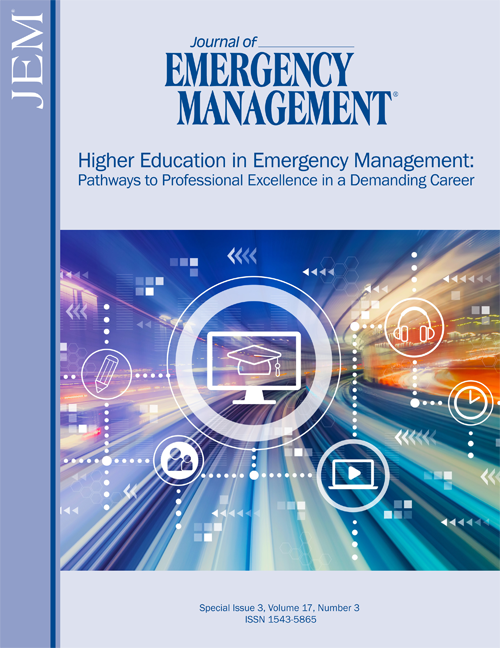Disaster mental health in higher education: A review
DOI:
https://doi.org/10.5055/jem.2019.0421Keywords:
disaster mental health, emergency management, social work, disaster behavioral health, higher education, curriculum, trainingAbstract
Disaster mental health (DMH), also referred to as disaster behavioral health, and crisis intervention more broadly, is a significant, yet relatively nonstandardized response system in the United States. Higher education can play a critical role in shifting understanding of DMH, its place within emergency management, and skills building among students. With the increased need for qualified DMH practitioners growing, the academy is uniquely positioned to train students as they become our future responders. Movement toward standardized curriculum and certification programs within schools of social work and emergency management can alleviate lack of knowledge and training as well as better prepare emergency managers and behavioral health professionals to respond to the emotional and mental wellbeing of those impacted by disasters (natural or human-caused).
References
University of South Dakota: Disaster mental health institute. Available at http://www.usd.edu/arts-and-sciences/psychology/dmhi. Accessed April 24, 2017.
Stebnicki MA: Disaster Mental Health Counseling: Responding to Trauma in a Multicultural Context. New York, NY: Springer Publishing Company, 2017.
Miller JL: Psychosocial Capacity Building in Response to
Disasters. New York, NY: Columbia University Press, 2012.
Miller G: Fundamentals of Crisis Counseling. New York, NY: Wiley Publishing. 2011. Available at https://ebookcentral.proquest.com/lib/empire-ebooks/reader.action?docID=879001&ppg=27.
Halpern J, Tramontin, M: Disaster Mental Health Theory and Practice. Brooks Cole Publishing: CA, 2007.
Flynn B, Sherman R: Integrating emergency management and disaster behavioral health: One picture through two lenses. 1 st Ed. Butterworth-Heinmann: Oxford, UK, 2017.
National Organization for Victims Assistance (n.d.): Crisis Responder Credentialing Program. Available at http://www.trynova. org/help-crisis-victims/responder-credential/. Accessed April 14, 2017.
National Organization for Victims Assistance (n.d.): The NOVA crisis response team. Available at http://www.trynova.org/helpcrisis-victims/overview/. Accessed April 24, 2017.
Georgia Department of Behavioral Health and Developmental Disabilities (2016): Georgia Disaster mental health. Available at http://www.georgiadisaster.info/index.html. Accessed April 14, 2017.
Georgia Disaster Mental Health (2016): Georgia Disaster Mental Health Training. Available at http://www.georgiadisaster.info/MentalHealth/training.html. Accessed April 27, 2017.
American Red Cross (2017): Eligibility Criteria for Disaster Mental Health Workers. Available at https://p.widencdn.net/zcl3a1/Disaster_Mental_Health_Eligibility_Criteria. Accessed April 24, 2017.
Federal Emergency Management Agency (2015): Crisis Counseling Assistance and Training Program. Available at https://www.fema.gov/recovery-directorate/crisis-counseling-assistancetraining-program.
Norris FH, Jessica L, Hamblen, JL et al.: Service characteristics and counseling outcomes: Lessons from a cross-site evaluation of crisis counseling after Hurricanes Katrina, Rita and Wilma. Adm Policy Mental Health. 2009; 36: 176-185.
Palinkis LA: A conceptual framework for understanding the mental health impacts of oil spills: Lessons from the Exxon Valdez oil spill. Psychiatry. 2012; 75(3): 203-22. doi: 10.1521/
psyc.2012.75.3.203. Available at https://www.ncbi.nlm.nih.gov/pubmed/22913496. Accessed April 13, 2017.
Cole V: A disaster behavioral health perspective (pp. 13-22). Ed. Flynn, B. and Sherman, R. Integrating emergency management and disaster behavioral health: One picture through two lens. 1st Ed. Butterworth-Heinmann: Oxford, UK. 2017.
Palinkas L: Behavioral health and disasters: Looking to the future. J Behav Health Serv Res. 2015; 42(1): 86-95.
Mincin J: Substance use during and after disaster: A practitioner's guide to best practices. In MacMillan & Sisselman, Addictions, 1 st Ed, 2017 (Forthcoming).
Barreau T, Conway D, Haught K, et al.: Physical, mental, and financial impacts from drought in two California counties, 2015. Am J Public Health. 2017; 107(5): 783-790.
Gould DW, Teich JL, Pemberton MR, et al.: Behavioral health in the Gulf Coast region following the deepwater horizon oil spill: Findings from two federal surveys. Behav Health Serv Res. 2017; 42(1): 6-22.
Larson S, Gould DW, (2014). Introduction to special section: Behavioral health and disasters – Planning for the next time. Behav Health Serv Res. 2014; 42(1): 3-5.
Framingham J, Teasley ML: Behavioral Health Response to Disasters. CRC Press: Boca Raton, FL, 2012.
Math SB, Nirmala MC, Moirangthem S, et al.: Disaster management: Mental health perspective. Indian J Psychol Med. 2015; 37(3): 261-271.
Figley C: CFE Certification Workbook Part I. Available at https://www.scribd.com/document/330605753/workbook-ameddsanantonio-2012july20-revaugust2013. Accessed May 1, 2018.
Benedek DM, Fullerton C, Ursano RJ: First responders: Mental health consequences of natural and human-made disasters for public health and public safety workers. Annu Rev Public Health. 2007; 28: 55-68.
Published
How to Cite
Issue
Section
License
Copyright 2007-2025, Weston Medical Publishing, LLC and Journal of Emergency Management. All Rights Reserved.






